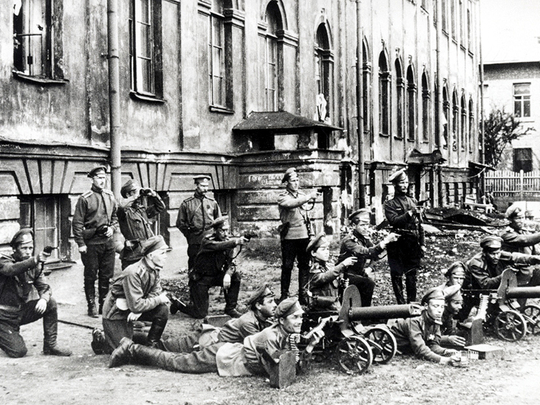
Moscow: Glorified during the Soviet era but denounced at the fall of the USSR, the 1917 Russian revolution is now taught in schools with a neutrality the Kremlin hopes will “bring the nation together”.
Just as Russian President Vladimir Putin celebrates episodes from both Soviet and Tsarist history, school textbooks shy away from choosing one side or another when it comes to the revolution and its consequences.
ALSO READ:
How the October Revolution unfolded
Expatriates look back on Russian Revolution
100 years after Russian Revolution: Thinking of the past evolves
Putin denounces Soviet founder Lenin
“Current textbooks describe 1917 in a way that is intentionally neutral, so that events from 100 years ago don’t threaten this new sense of national stability,” said Leonid Katsva, a 59-year-old history teacher.
“The Kremlin has a violent fear of any sort of revolution,” he told AFP.
A century after the revolution that launched the Communist era, textbooks ask children to describe what they do and do not like about the Bolsheviks, led by Vladimir Lenin and Leon Trotsky, who seized power in 1917.
Other assignments include separating fact from fiction in a Soviet film, book or painting, and telling a story from the point of view of both a Bolshevik and an anti-Communist.
Textbooks
One widely used textbook cites the opinion of Western academics on the revolution — and encourages students to consider Trotsky’s writings, or Lenin’s decision to grant independence to Finland but not Ukraine.
The same book underlines the “international impact” of the 1917 revolution, while noting the failure of the social model it ushered in.
Enver Abdulaev, a teacher who oversees a state review of history textbooks, says editions since 2013 have been “much more balanced” than those before.
“You won’t find either a blackening or a glorification of the Soviet past in them,” he said.
In Soviet-era textbooks, Lenin was presented as an eternal hero. His image could be found in every public space and each school child knew the lines from a poem by Vladimir Mayakovsky: “Lenin lived, Lenin lives, Lenin will live forever”.
But with the opening of Soviet archives at the end of the 1980s, just before the break-up of the USSR, the October Revolution came to be seen by many historians as a violent coup d’etat.
For children who were educated in the 1990s, the Communist leader was a criminal responsible for the Bolsheviks’ “bloody terror”.
An unpredictable past
In the face of this ideological u-turn, it became difficult to find coherent educational material, to the extent that in 1988 the written history test for students in their final school year was cancelled.
Teachers designed their courses around the revelations about the past then being published in the media.
“We went from one extreme to the other: first the Bolsheviks were glorified, then their opponents were put on a pedestal,” history teacher Katsva recalled.
Dozens of new textbooks brought out over the course of the 1990s completely rewrote the history of the 1917 revolution, largely casting the Soviets and their supporters as villains.
A joke at the time went: “Russia is a country with an unpredictable past.”
But when Putin came to power in 2000 he set out to use history as a tool to make Russians feel a sense of pride in their country again.
In 2007, the president criticised textbooks from the post-Soviet period, saying that they instilled a “sense of guilt” rather than “promoting civic values to bring the nation together”.
Unlike the books from the 1990s, today’s school texts no longer present the revolution as a “bloody Bolshevik experiment” but do cover Lenin’s calls for his enemies to be repressed.
“The modern textbooks set out the facts without imposing a judgement,” Abdulaev said.
But the history teacher with some 30 years experience added it was no longer possible to impose a black-and-white worldview on pupils.
“Students don’t just soak up the teacher’s words any more. With the internet, they live in a world with multiple voices.”












